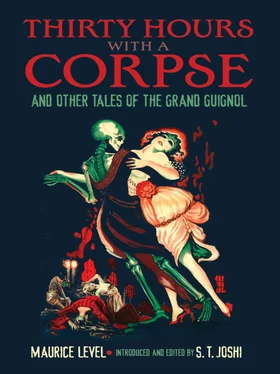Marbois entered followed by his man.
“It is three thousand, six hundred and sixteen francs and that includes costs,” he said. “Can you pay it?”
“No, Monsieur,” Guiret said firmly, with a warning glance at Barthe.
“Then I must make an attachment.”
“All right. Do so.”
Marbois sat down at the table, took out a sheet of stamped paper and a fountain pen.
“The furniture here, it is yours?”
“Not all of it. The bed, the table, the chairs, you cannot touch. You know that. They are our tools of work. The rugs, the draperies, the pictures and the bookcases are ours.”
The assistant commenced his inventory in a high-pitched voice:
“A bookcase with glass doors, bronze lamp, Chinese rug—”
“But—” Barthe began nervously.
Guiret scowled at him and he did not speak again until the sheriff’s officer and his man had gone into the bedroom.
“But we have money to pay.”
“Don’t be stupid! What would be left for us, then? We must buy the three tickets, and then there’s our living expenses where we’re going.”
“That’s right.”
Marbois came back into the living-room briskly. “Will you sign this, please?”
Guiret took the pen in a steady hand. He was about to write his name when the officer interrupted him.
“Wait a moment, we’ve forgotten something.”
“What?”
“This trunk.”
“But that is our trunk.”
“I know that. But will you be kind enough to open it?”
“Will I—what?”
“Open it.”
“Why?” Guiret asked.
“How do I know that it does not contain property that should he inventoried?”
“There’s nothing there except our books, our papers. They constitute our tools of work and cannot be attached.”
“That is true, but I must assure myself.”
“I give you my word, Monsieur.”
“Don’t waste time. Let’s get at it.”
“But I say—did you not hear what I told you? It contains our personal belongings—” Guiret’s tone was that of a man who would not tolerate that his word should be questioned.
The officer took a pompous voice now: “If my presence here and my insistence on doing my duty annoys you, you can get rid of both by paying.”
Guiret drew himself erect proudly: “I have no lessons to take from you, Monsieur.”
“I ask you for the last time, will you open it?”
“And if I refuse?”
“I am here to take legal judgment. I will go to the Commissioner of Police who will doubtless authorize me to return with a locksmith.”
“All right, do that!” Guiret said angrily, playing for time. “Before the police I will do what is necessary. But I forbid you to so much as put your hand upon it.”
The officer drew back slightly before the pallid, distorted, angry face that was lifted defiantly toward him, then with a commanding gesture of warning to Guiret to stay at a distance he spoke to his man:
“Ask the Commissioner to send a gendarme.”
But Guiret had been thinking rapidly. A moment before he had intended to get rid of these men some way, any way, and flee with Barthe. That was neither wise nor necessary.
“All right, I’ll pay you.”
“Why didn’t you say that before?”
“And if I do you will not insist on opening the trunk?”
He asked this question in a heavy constricted voice and the officer glanced at him suspiciously and took his time before replying.
“If you pay that annuls the attachment.”
“Very well, I will pay.”
He opened his wallet, having forgotten for the moment that he had given the concierge a five-hundred franc bill to change. The sweat broke out on his forehead, but he recovered quickly and turned to Barthe.
“What about it, Armand?”
“But you said yourself—that we—” Barthe stammered.
“Will you give me the money and bring this to an end?”
Barthe took out his wallet slowly. “I think you’re wrong, but—”
Guiret snatched the bills from him: “How much was it, did you say?”
“Three thousand, six hundred and sixteen francs, including costs.”
Guiret found the strength to be ironical: “Justice is not for nothing, I see!”
When he counted the money he saw that he had only three thousand francs.
“Take this and I’ll send you the rest,” he said.
“You know I cannot do that.”
“But I give you my word to send you the rest tomorrow, this afternoon if you wish.”
“My orders are formal. And anyway if you intend to pay, it is not important. In a few hours when you get the money as you say you will have it, you can pass by the office and pay. You have twenty-four hours to do that after the attachment.
“So, if you’ll let me throw an eye in that trunk—”
“No—no—no!” Guiret stammered. Then as he felt the other’s curious gaze resting upon him: “There you go again, doubting my word!”
He felt a sort of madness gaining upon him. It entered his head to throw himself upon the sheriff’s officer and strangle him, stop forever that insistence of his on opening the trunk. But the other man was there and at the first gesture he would enter into the struggle and Barthe was trembling so much that he would be of no help, doubtless would run at the first sign of conflict. Reason came at last.
“How stupid I am! Legros, the concierge, has five hundred francs that I gave him to get changed. He is waiting for his wife to get back. Perhaps he’s downstairs. Or if he’s not then he’ll be back soon with the change. Armand, go down and see—” But as Barthe moved eagerly toward the door, Guiret caught a glittering, mad, desperate light in his eyes: “No, no, you stay here, Armand. I’ll attend to all this. You realize that I am doing my utmost to get the money, do you not, Monsieur?”
His face was so pale, his eyes so distracted that after he went out, the sheriff’s officer spoke to his man: “Follow him,” he said.
Barthe, who had seated himself in the armchair, weak with relief when the affair seemed to have been arranged, looked up tensely, when he heard the officer give the order.
“I know who you are,” he said.
“Well, I know that myself,” Marbois said, shortly. “What’s the matter with you fellows, anyway?”
“You’d like to know what’s in that trunk?” Barthe asked.
“What’s all this about the trunk?”
“You’d like to know, wouldn’t you? That’s what you say to us. You know all right. Books in the trunk, eh? You know better.” He unfastened the straps, took out his key-ring which Guiret had given back to him after he had taken it from him to lock the trunk. “You’re a brave man, I hope.” With a swift turn of the wrist he turned the key: “Quietly, please. She’s asleep, that’s all. Yes, she’s there, and you’ll agree with me she’s very pretty.”
He lifted the cover with careful deliberation. An odor rose like a cloud into the face of the sheriff’s officer. The flesh on the body was mottled, there was a large hole in the breast, the lips of which had already turned purple. Marbois fell back and uttered a startled cry. Barthe laughed:
“It’s worse than you thought, eh?”
Just then Guiret pushed the door open, the change in his hand, a smile on his face. He saw the open trunk, he stared for a moment at the two men in the room, then turned to flee. The man who had followed him was coming in the door. They grappled.
“Armand—Armand—help—help me out—why do you stand there—help—”
But Barthe was seated again now: “He’s not the sheriff’s man. He’s from the police. He didn’t fool me. Marousse sent him here—Marousse sent him here—”
Guiret passed quickly from frenzy to complete submission. The money was scattered all about him on the floor and he stooped to pick it up.
Читать дальше












